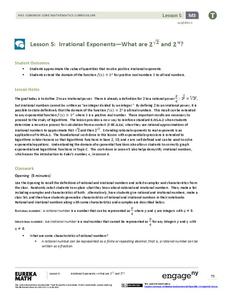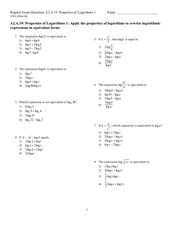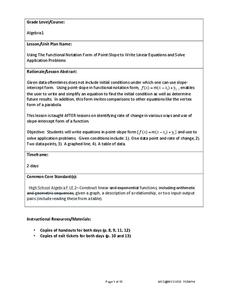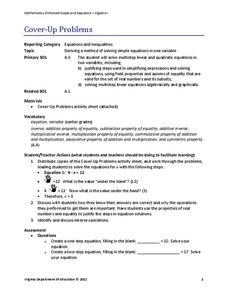Inside Mathematics
Functions
A function is like a machine that has an input and an output. Challenge scholars to look at the eight given points and determine the two functions that would fit four of the points each — one is linear and the other non-linear. The...
West Contra Costa Unified School District
Matching Quadratic Functions
Ever sigh when learners ask why they have to know so many different forms of the quadratic equation? Here is a lesson that comes in handy! Using hands-on matching activities, quadratic equations are explored through...
EngageNY
Irrational Exponents—What are 2^√2 and 2^π?
Extend the concept of exponents to irrational numbers. In the fifth installment of a 35-part module, individuals use calculators and rational exponents to estimate the values of 2^(sqrt(2)) and 2^(pi). The final goal is to show that the...
EngageNY
Building Logarithmic Tables
Thank goodness we have calculators to compute logarithms. Pupils use calculators to create logarithmic tables to estimate values and use these tables to discover patterns (properties). The second half of the lesson has scholars use given...
Curated OER
Regents Exam Questions: Properties of Logarithms 1
In this logarithms worksheet, students match given equations to its equivalent equation. Students solve logarithms. This four-page worksheet contains twenty multiple-choice problems. Answers are listed on the last page.
Curated OER
Basic Ideas of Functions
In this Algebra I/Algebra II worksheet, students determine whether or not a relation is a function. Students determine the domain of a function and express the answer in interval notation. The three page worksheet contains...
Curated OER
Division of Polynomials
In this algebra worksheet, learners divide polynomials by monomials and binomials. They use the correct property of the quotient rule when dividing. There are 9 questions with an answer key.
Curated OER
Worksheet 11
In this math worksheet, middle schoolers define a function f(x) by the following rule: for any x ∈ R,set. They also define the domain and range for the functions.
Curated OER
Simplifying Using "The Order of Operations" Worksheet
In this order of operations worksheet, students solve equations with one variable using order of operations. Equations contain fractions, exponents, parenthesis, and the four basic operations of addition, subtraction, multiplication and...
Curated OER
Power Word Problems
In this powers worksheet, 10th graders solve 10 different word problems that include various expressions with powers. First, they write an expression for volume of a cube that has a certain width, length, and height. Then, students...
Curated OER
Equations Worksheet
In this math worksheet, students create and solve equations with the help of Algebra Tiles. Then they apply formulas for geometry to find the perimeter of a polygon.
Curated OER
Solving Quadratic Equations
In this quadratic equations worksheet, 9th graders solve 10 different problems that include various quadratic equations. First, they factor out the equation and set it to zero. Then, students solve each factor and check their work by...
Curated OER
Hyperbolas
In this hyperbolas worksheet, 10th graders solve 10 different problems that include various forms of hyperbolas. First, they write the equation for each given hyperbola using standard form. Then, students determine whether the hyperbolas...
Curated OER
Identity and Equality Properties
In this identify and equality properties worksheet, 9th graders solve and complete 14 different problems. First, they solve each equation for the given variable. Then, students name the property or properties illustrated by each...
Curated OER
Topic 5.2 - Polynomials
For this polynomials worksheet, students simplify the first 4 expressions on the page. They are instructed to use FOIL when simplifying the last 9 expressions.
Curated OER
Complex Numbers
In this complex numbers worksheet, students simplify the expressions of complex numbers and use the answers to answer a riddle. Students complete 15 problems.
West Contra Costa Unified School District
Point-Slope Application Problems
Create a linear equation for a problem when the intercept information is not given. The two-day lesson introduces the class to the point-slope form, which can be used for problems when the initial conditions are not provided. Pupils...
Virginia Department of Education
Cover Up Problems
Don't cover up this resource — use it out in the open! Pupils learn how to cover up various parts of a linear equation in order to help solve the equation. A worksheet of problems provides practice with this skill.
Curated OER
Identity and Equality Properties: Pages 37-43
In this math worksheet, young scholars use a list of mathematical properties in order to justify their evaluations. Students name multiplicative inverses and properties illustrated in 13 numbers and statements.
Curated OER
Complex Numbers
In this complex numbers worksheet, 9th graders solve 10 different problems that include either adding or subtracting complex numbers. First, they determine the sum of the real components. Then, students determine the sum of the imaginary...
Curated OER
Polynomials
In this College algebra worksheet, students determine the degree of polynomials. Students add, subtract, multiply, divided and factor polynomials. The two page worksheet contains thirty-eight problems. Answers are no...
Curated OER
Factoring Test
In this algebra worksheet, students simplify monomials, perform basic operations on two polynomials, and factor binomials and trinomials. There are 20 questions and a bonus.
Curated OER
Extra Practice 12: Solving Formulas
In this formula worksheet, learners solve formulas for a given variable. There are twelve problems on this one-page worksheet.
Curated OER
Rational Equations
In this rational equations worksheet, 9th graders solve 10 different problems that include various forms of rational equations. First, they determine the least common denominator in each equation. Then, students compare numerators and...

























